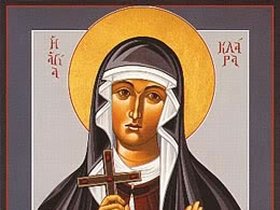HOMILY WEEK 19 03 – Year I
The Power of Forgiveness: Memorial of St. Clare
(Dt 34:1-12; Ps 66; Mt 18:15-20)
*********************************************************
The gospel today invites us to encounter Jesus face to face through forgiveness and heart-felt prayer.
Matthew 18:15-20 is perhaps one of the most potent yet least appreciated passages in all of the New Testament. In it, Jesus teaches us to forgive those who hurt us, and how to do it. The process is basically this: ask permission to share with the hurtful other, describe their hurtful behavior, share your feelings of hurt with them with love (no revenge, punishment or getting even), tell them you are trying to forgive them, and then give it to God and let it go.
As Jesus mentions, if the person doesn’t listen, then it is wise to make the circle wider and take others with you. I have done that numerous times for victims of sexual abuse who wanted to confront their abusers to provide support and to be a witness to what transpires.
The interesting comment by Jesus at the end of his teaching to “treat them like gentiles of tax collectors if they don’t listen” is often misunderstood to mean shun them, change the locks on your doors or get a peace bond. The true meaning is just the opposite. Who in the gospel of Matthew is a tax collector? Matthew himself. He is saying, “Treat them the way Jesus treated me when I was gouging the poor – he forgave me and called me to follow him.” And in the gospel of Matthew, who are the Gentiles? We are. For Matthew, Jesus’ words, “Go to all nations and teach them my commandments,” means teach them to love and forgive one another.
That teaching is borne out a few lines later when Peter asks how many times we should forgive – 7 times? Jesus replies, not 7 but 77 times (a combination of the perfect numbers 3, 4, 7 and 10). The teaching is we must not just forgive a few times, but we must be like Jesus and become forgiveness – it has to become part of our DNA and ooze out of us.
Jesus then adds a very striking comment – what we forgive here on earth is forgiven in heaven, and what we fail to forgive here actually holds back the reign of God that Jesus came to inaugurate. That came home to me powerfully when I wrote a letter to my father eleven years after he died to share with him all the feelings I had about our relationship that I never told him while he was still among us. That experience transformed my relationship with him – I was no longer a kid and he a big daddy, we had become friends.
Suddenly, I had the insight that if I was healing in my relationship with my father because of my letter to him down here, then perhaps he was healing in his relationship with me wherever he was, perhaps in purgatory (which can be defined as the pain of entering heaven). The thought that I was helping my father enter heaven (because we cannot drag into heaven any unfinished business) stirred me to the depths of my heart, and even changed the color of the world to a warm, bright amber. Equally exciting was the awareness that I was experiencing the communion of saints. Forgiveness is truly a powerful reality.
The gospel closes with the admonition to pray with confidence, knowing that when we gather in Jesus’ name, he is present among us. To pray for the ability to forgive from the heart is certainly to pray according to his will, and that prayer will certainly be answered.
 St. Clare, whom we honor today, was born in Assisi about the year 1193. At the age of 18, she heard a sermon preached by Francis of Assisi and committed herself to a life of poverty. On Passion Sunday 1212 she secretly left home and went to the place where Francis lived with his community. Before the altar in the little church, she received the habit from him and went to live in a nearby Benedictine convent.
St. Clare, whom we honor today, was born in Assisi about the year 1193. At the age of 18, she heard a sermon preached by Francis of Assisi and committed herself to a life of poverty. On Passion Sunday 1212 she secretly left home and went to the place where Francis lived with his community. Before the altar in the little church, she received the habit from him and went to live in a nearby Benedictine convent.
Clare was joined by her younger sisters Agnes and others, and the small community moved to San Damiano, near Assisi. Soon after, Clare’s mother and sister Beatrice also joined them. In 1215, Clare was made abbess of the Poor Clares. The women modelled their life on the ideals of St. Francis. They did without shoes, slept on the ground and never ate meat. Before long, other houses were founded in several countries.
Francis taught all his friars’ needs should be met solely from daily contributions. It was Clare’s great desire that her community also practise radical poverty. For 40 years Clare was abbess and never wavered from caring for her community or from assisting Francis. She received papal approval for her own Rule the day before she died – the first rule written by a woman for women. She was credited with many miracles and canonized just two years after her death.
The Eucharist is an experience of both forgiveness and healing, a celebration of the presence of Jesus among us through both Word and Sacrament. Let us pray that our celebration will empower us to live this gospel of forgiveness daily in our lives.



